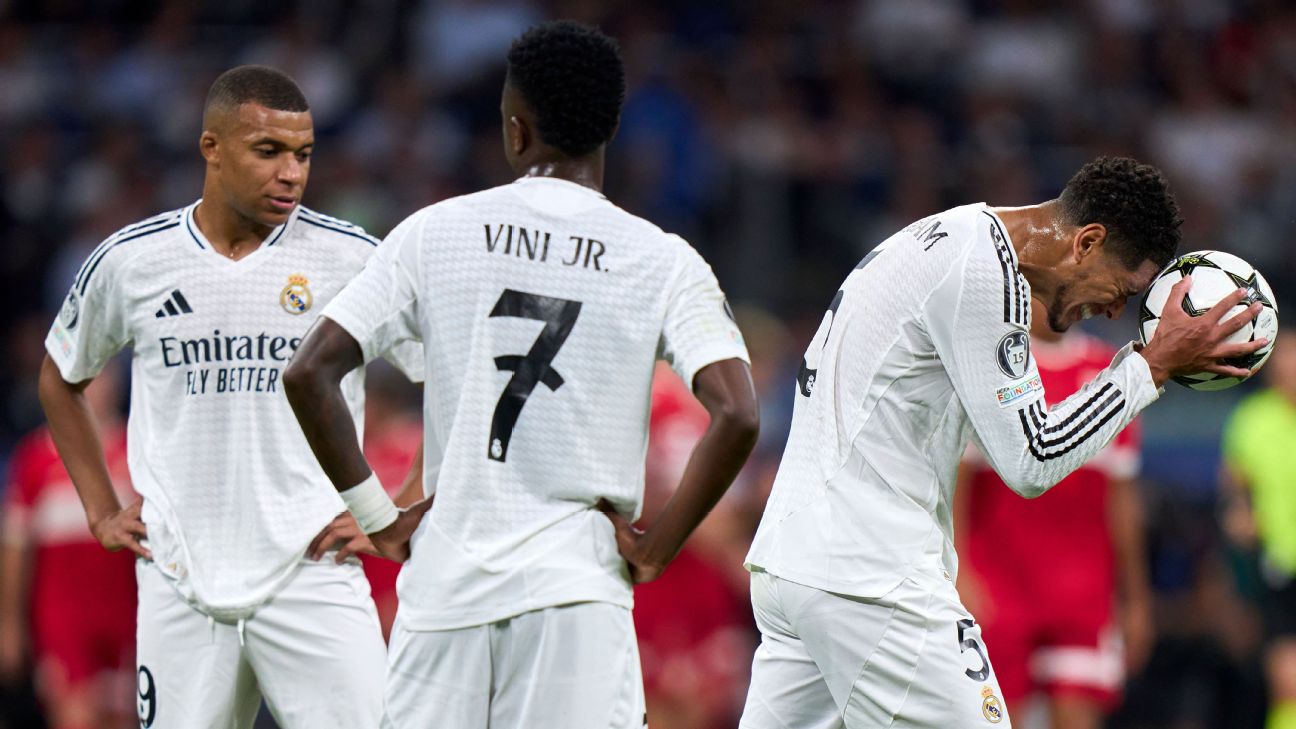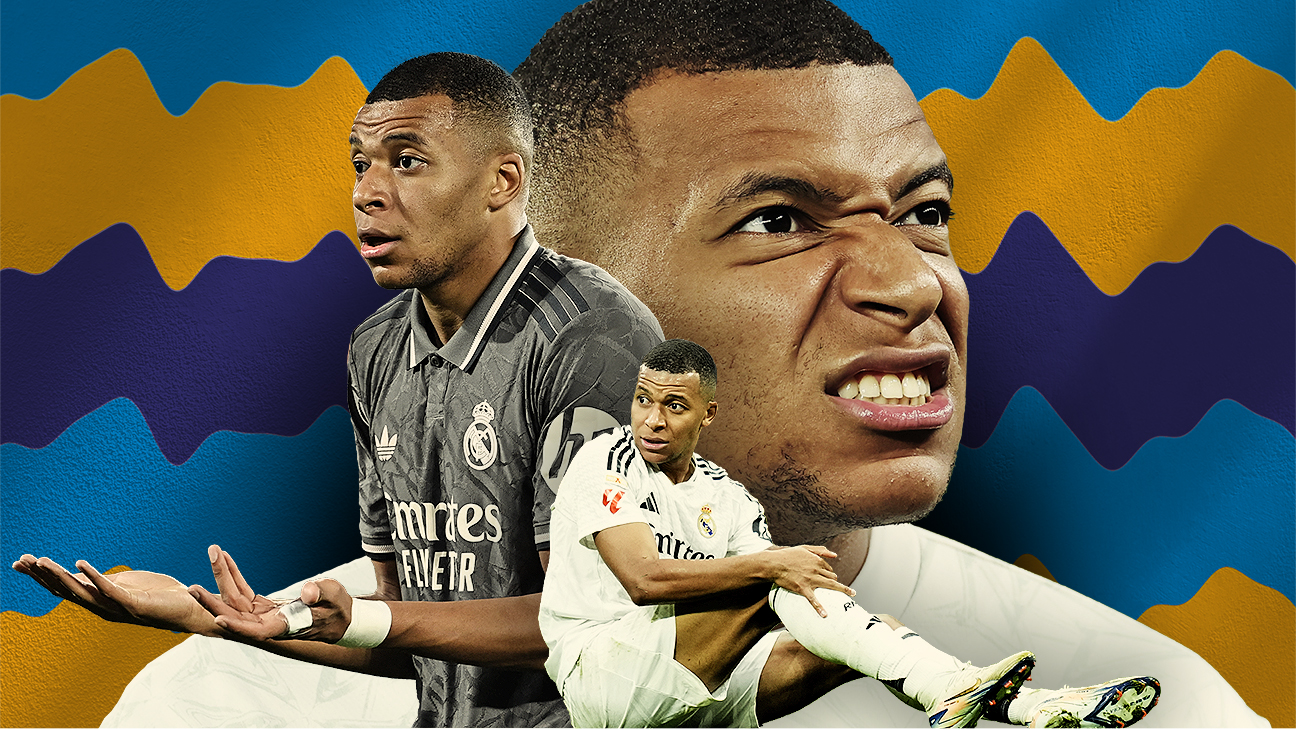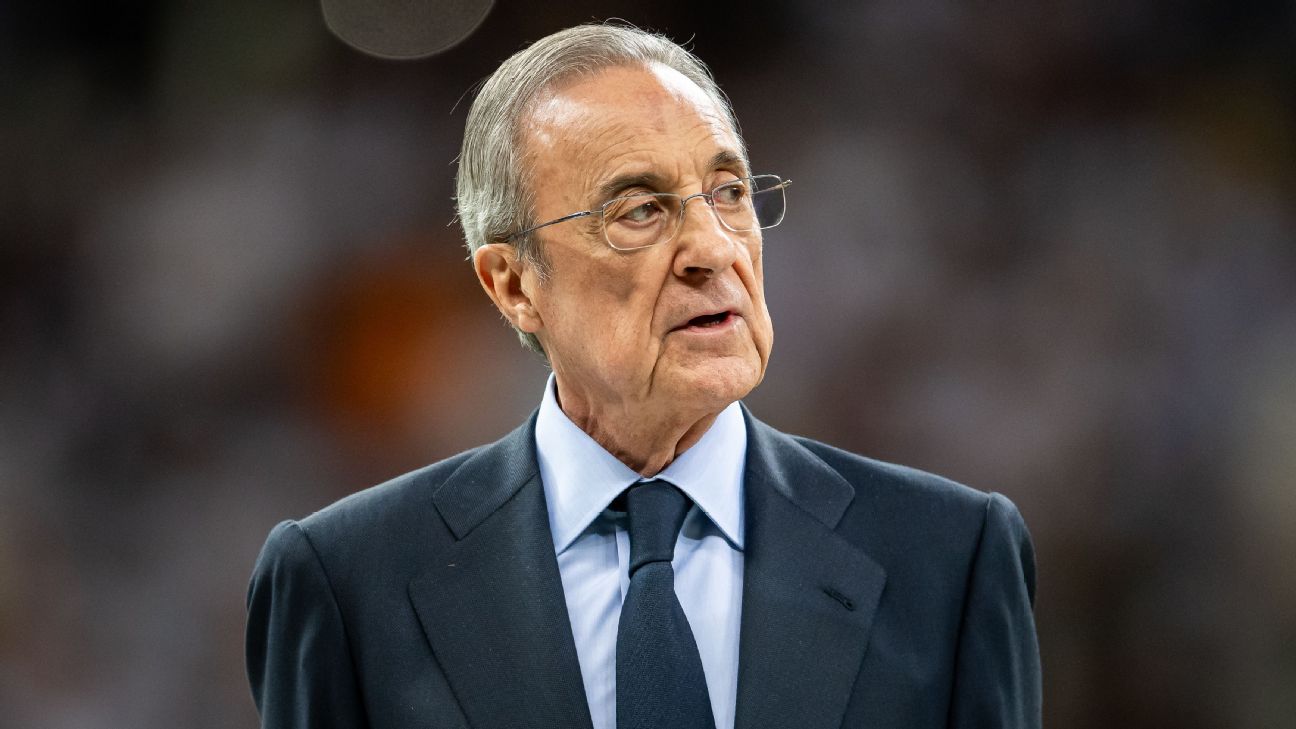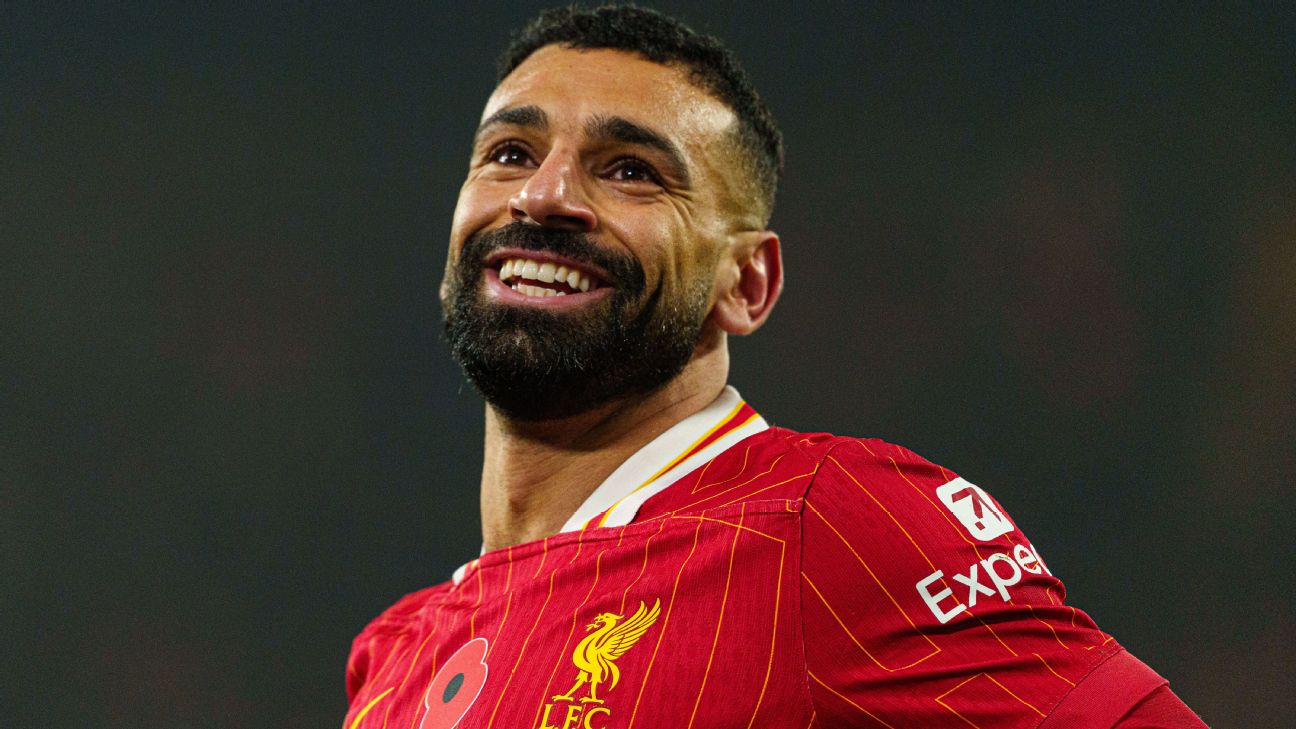It was half-time during Real Madrid’s first LaLiga game of the season vs. Real Mallorca, and midfielder Jude Bellingham had some feedback for forwards Kylian Mbappé, Vinícius Júnior and Rodrygo Goes: “You three, finish the attacks!”
As the four players waited in the Mallorca tunnel to head back on the pitch, Bellingham’s analysis — picked up by a broadcaster’s microphone — couldn’t have been more candid. Yes, Madrid were leading 1-0, but they needed to be more clinical. “Because the run back…” Bellingham continued, smiling ruefully at the thought of having to put in more of a shift after an already exhausting first half, before swearing loudly.
Just 45 minutes into the new season, Real Madrid’s dilemma was perfectly summed up in a few words. How do you fit Mbappé into a side already packed with attacking threat? And can you do so without overworking the midfield and unbalancing the team?
That day, Bellingham’s plea went unheeded. Vedat Muriqi levelled for Mallorca; Madrid didn’t score again, and they dropped two points in their first game of their league title defence.
Madrid’s plan this season was supposed to be foolproof. Add Mbappé — a player who has averaged 39 club goals per season for Monaco and PSG since 2018 — to a team that last term won LaLiga by 10 points and beat giants such as Manchester City and Bayern Munich to claim the Champions League (again), and then steamroll the opposition.
So far, more has turned out to be less. Madrid haven’t been terrible — they’re second in LaLiga, three points behind Barcelona, and haven’t lost a domestic game going into Saturday’s El Clásico (stream LIVE at 3 p.m. ET on ESPN+) — but they haven’t regularly sparkled, either.
After the 1-1 draw at Mallorca, there was another at Las Palmas, and another at Atlético Madrid — a total of six valuable points dropped. In the Champions League, Madrid lost 1-0 at Lille, in their worst performance of the campaign. On Saturday, they beat Celta Vigo 2-1, thanks to two outstanding goals from Mbappé and Vinícius, but were fortunate and frequently outplayed as Celta created four “big chances” for a total xG (expected goals) of 1.69, compared with Madrid’s 0.74.
Tuesday’s 5-2 comeback win over Borussia Dortmund in the Champions League after being 2-0 down showed this team’s two, contrasting faces: a frustrating first half, followed by an irresistible second, led by Vinícius.
So, has the impact of Mbappé’s long-awaited arrival been more positive or negative? What other factors have contributed to Madrid’s uncertain start? And are they finally getting their act together in time to face Barcelona in their biggest game of the season?
Additional reporting from Rodrigo Faez, Gustavo Hofman and Julien Laurens
Defending from the front
Ask coach Carlo Ancelotti to identify the basis of Madrid’s success last season, and he doesn’t name Bellingham’s clutch goals, Vinícius’ improved finishing, or Toni Kroos’ incisive passing. Instead, he cites the team’s “collective commitment,” the willingness of their superstars to work hard off the ball.
“It’s been a good season because of our quality, and because of the commitment of the players behind that quality,” Ancelotti said in May, before the Champions League final win over Borussia Dortmund at Wembley. “That’s been the key. Quality without commitment? You don’t get to the final.”
That all-hands-on-deck approach has been sacrificed to incorporate a player of Mbappé’s extraordinary talents following his free transfer from Paris Saint-Germain.
Ahead of Saturday’s game at Celta, statistics from Mediacoach — the video analysis tool used by LaLiga clubs — showed that Mbappé and Vinícius were the two LaLiga forwards who had spent the most time walking during games. Vinícius had spent 47.36% of his time on the pitch at walking pace; Mbappé, 47.19%. The league average was 41%. There are 123 players who have featured in LaLiga this season who can be classified as forwards, and Mbappé ranked 60th in terms of distance covered.
After 10 rounds of LaLiga games — Mbappé has featured in nine of them — data from Stats Perform shows that he has made eight ball recoveries in the opposition half, a key metric for any team looking to press their opponents when out of possession. There are 24 forwards in LaLiga who have made more recoveries in the attacking half, including Barcelona’s Lamine Yamal (20) and Raphinha (16). Even ageing centre-forwards such as Celta’s Iago Aspas, aged 37, and Barça’s 36-year-old Robert Lewandowski have made 12 recoveries, the same number as Vinícius.
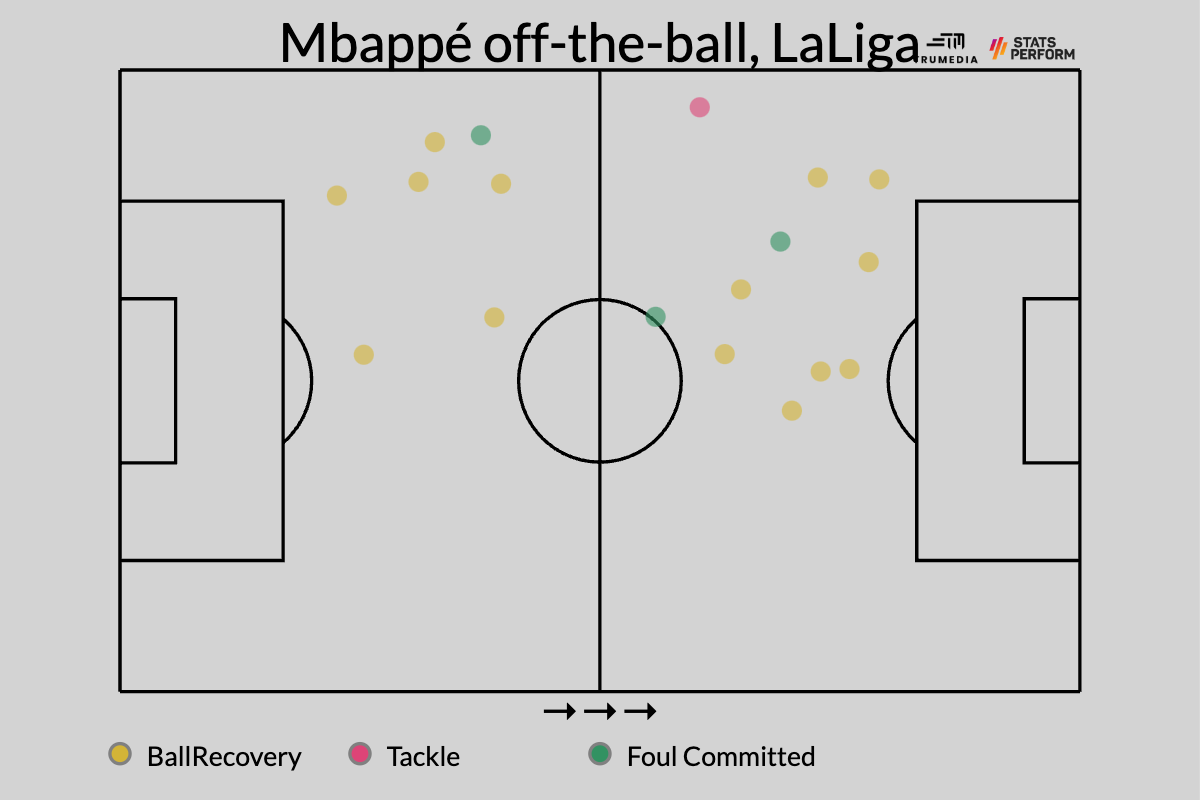
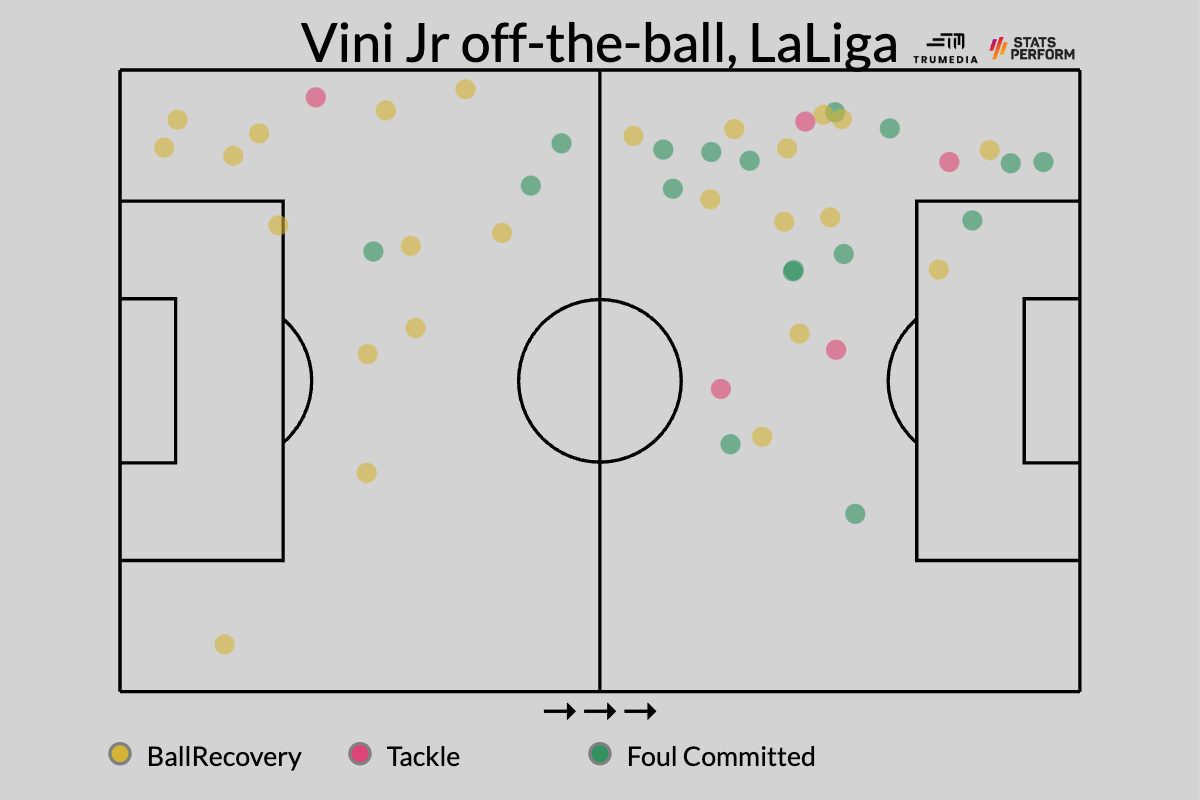
When the total number of “defensive interventions” — which include recoveries, tackles, interceptions, clearances, blocks and aerial challenges — in LaLiga are tallied up, Mbappé has made 15, ranking 74th among forwards. The figure compares unfavorably with Lewandowski’s 34, Vinícius’ 37, Iñaki Williams’ 45, or Antoine Griezmann’s 46.
Of course, Mbappé’s on-field contribution extends far beyond winning the ball, and it would be unfair to ignore his impressive offensive output. “I prefer him to score goals rather than pressing,” Ancelotti said on Monday. And sources told ESPN that Mbappé, too, is conscious that he needs to do more to help the team. He has scored six goals in nine LaLiga games, and created 10 chances for teammates. Only Lewandowski (14), Raphinha and Yamal (10) and Vinícius (nine) have contributed more goals and assists. But the “collective commitment” of last season is not quite so robust this term.
Injuries and exits
Madrid’s failure to lift off this season isn’t just about the work rate of their forward line. The absence of important players — some are sidelined with injuries; others have moved on — has played its part.
An injury kept Bellingham out for a month between Aug. 18-Sept. 17, a period in which, 12 months earlier, his four goals in five games helped Madrid deal with a tricky early-season run. Eduardo Camavinga, a player whose skillset is useful in a team that needs to blend midfield physicality with craft and invention, missed six weeks with a knee problem.
Brahim Díaz picked up a long-term groin problem in September, just when he had won Ancelotti’s confidence as a player who could offer variety in attack. And the defence is understaffed with no return in sight for David Alaba after his ACL tear, Dani Carvajal now a season-long absentee with a knee injury, and no replacement for the departed Nacho Fernández.
Two more players who left Madrid in the summer have also been missed. By late October 2023, forward Joselu had scored five valuable goals in LaLiga in wins over Getafe, Real Sociedad, Las Palmas, Girona and Osasuna. His nominal replacement in the squad, the talented €72m Brazilian teenager Endrick, has just one league goal in 2024-25.
But it is the retirement of Kroos that has left a gaping void in midfield. It was obvious that Madrid would miss one of their all-time greats — even in his farewell season, he was one of the league’s most influential players — but his importance in bringing order to the team is ever more apparent.
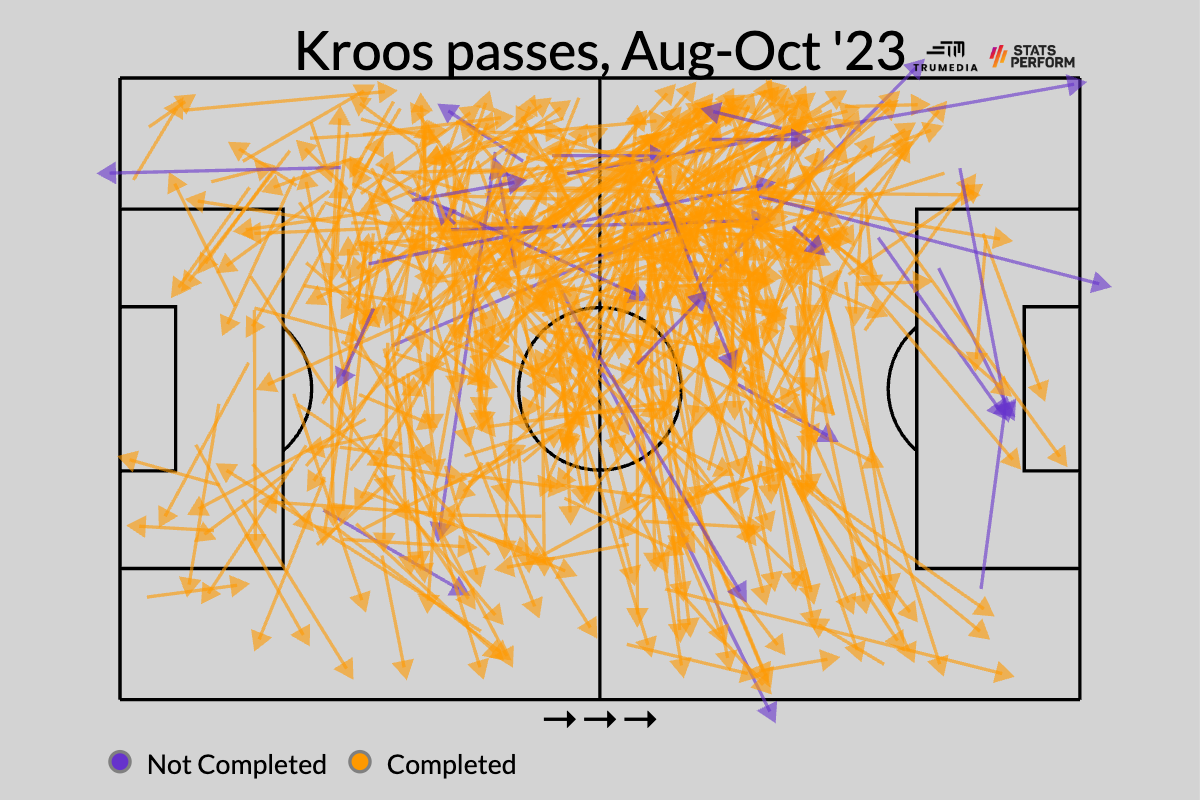
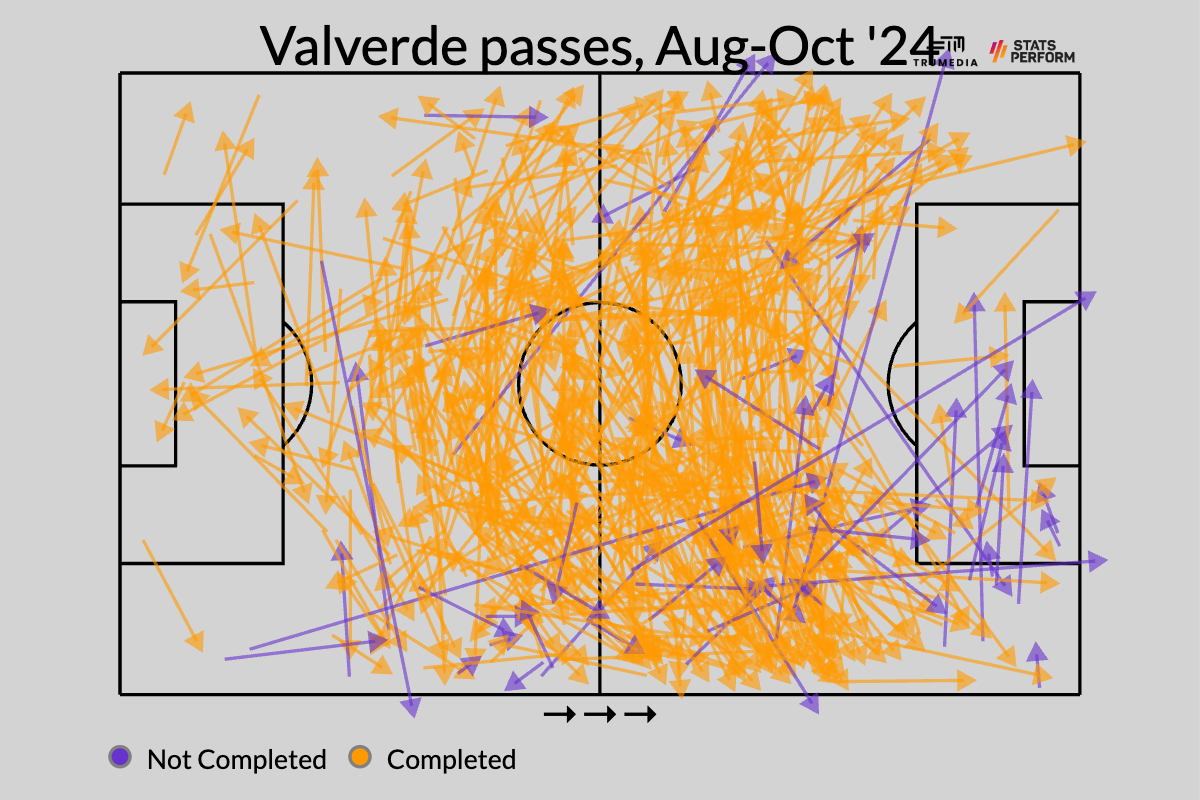
Without him, there is more responsibility on the shoulders of two midfielders, Aurélien Tchouaméni and Federico Valverde. In many ways, the pair have risen to the challenge: both have had more touches and completed more passes than any other midfielder in LaLiga. Valverde is Kroos’ chosen successor, taking on his No. 8 jersey.
“I believe in [Valverde],” Kroos told Marca this week. “Now he has to take the responsibility, and take the risks, that I took on the pitch.” But Valverde is not yet able to offer the same subtlety or tempo-setting consistency. Tchouaméni is working to improve on the ball, sources told ESPN, and has been discussing his role with Ancelotti, as well as using video analysis.
Tactical tweaks
Madrid are winning games, but — for all of Ancelotti’s tinkering with the formation, in an ongoing quest to find a workable system that includes Mbappé — they aren’t controlling them. Their 2-0 win over Villarreal on Oct. 5 was a case in point. Villarreal dominated the first half; two individual strikes from Valverde and Vinícius meant that ultimately didn’t matter.
Alongside Tchouaméni and Valverde, there is a growing reliance on Kroos’ old partner, Luka Modrić. The 39-year-old midfielder was phased out of the team last season; now, he has started five of Madrid’s past eight league games. Against Celta, he became the club’s oldest player, coming off the bench to set up the winner with a defence-splitting pass. Modrić being this important in the twilight of his career was not part of the plan.
As Madrid have struggled to impose themselves, the team’s formation has evolved. The three-man forward line of Mbappé, Vinícius and Rodrygo had been ditched by the time Madrid hosted Villarreal. Mbappé and Vinícius started as a front two while Valverde, Camavinga, Modrić and Bellingham offered a more robust midfield. Against Celta on Saturday, there was another variation, with Bellingham and Vinícius on the flanks, either side of Mbappé.
Ancelotti’s preferred XI is relatively clear — only 12 Madrid players have 500-plus minutes in LaLiga, with the only doubt being whether Rodrygo or an extra midfielder starts — but the team’s shape has remained in flux.
Too many changes can lead to confusion. In the first half at Balaídos, Ancelotti was unusually animated on the touchline, desperately trying to correct Tchouaméni’s positioning as the midfielder dropped ever deeper, between Éder Militão and Antonio Rüdiger, to form a back three.
“Aurélien played between the two centre-backs when we had the ball,” Ancelotti said afterward. “But without the ball, he was supposed to push up. I didn’t explain it well enough.”
Adjustments through in-game management are one thing; a player’s fundamental misunderstanding of their intended role is another. Such a mistake — against a team with better finishers than Celta, who spurned three of their four “big chances” to score — could have been costly.
“There’s been a change,” goalkeeper Thibaut Courtois said this week. “Some players have left; others have arrived. You have to adapt, and it isn’t something [that takes] one or two months. It will get better.”
Will patience pay off?
Ancelotti knew that Mbappé’s arrival would require changes. Sources close to the veteran coach told ESPN that the team and player taking time to get used to each other had come as no surprise.
After all, this was a Madrid team that had already forged a clear identity last season, flourishing in a well-drilled 4-4-2. In particular, the position of Vinícius — Madrid’s best player in the second half of last season, following Bellingham’s starring role in the first — was always likely to demand fine-tuning, given he and Mbappé’s shared propensity to favour the left-hand side.
That might lead you to believe that there is friction between the two stars, but that is not the case, sources close to the Brazilian told ESPN. The idea of playing with Mbappé always appealed to Vinícius. In fact, he anticipated more spaces opening up for him to exploit, with defenders’ attention now divided between the two world-class forwards.
While Mbappé has formed a close-knit group with France international teammates Tchouaméni, Camavinga and Ferland Mendy, as well as a friendship with Bellingham, he and Vinícius get on well. They have even shared penalty-taking duties for Madrid this season, alternating as they see fit, without any drama. By contrast, teammate Rodrygo has been increasingly vocal about his unhappiness with his role as a makeweight.
“Often, I’m just filling spaces,” he told ESPN while on international duty with Brazil last month, referring as much to the national team as his club. “Is someone missing there? Put Rodrygo in. Is someone missing on the right? Rodrygo. Is someone missing as No. 9? Rodrygo. That’s it. It may get in my way a little, but I’m a team player.”
That’s as outspoken as Rodrygo is likely to get, but sources told ESPN that he is bothered by his situation at Madrid and unhappy about being the player asked to shift around to accommodate others.
In the high-pressure environment that surrounds Real Madrid, any minor slip can quickly become a catastrophe. Some perspective is helpful, and Madrid’s record in LaLiga this season doesn’t read like a crisis: 10 games, seven wins, three draws. Only Barcelona have scored more goals; only Atletico Madrid have conceded fewer. And Madrid have created as many chances as Barcelona (132).
A win over Barcelona at the Bernabéu would leave the two teams level on points at the top of LaLiga, setting up a gripping title race. Madrid are also on the brink of history; avoiding defeat on Saturday would make it 43 league games unbeaten, matching Barça’s all-time LaLiga record set in 2017-18.
It begs the question: if this is how Madrid fare without playing well, what happens if the team finally gels?
“We aren’t at 100%, obviously,” Ancelotti admitted on Monday. “We’ve got good results. But we have to improve in terms of our play. And little by little, we will.”
